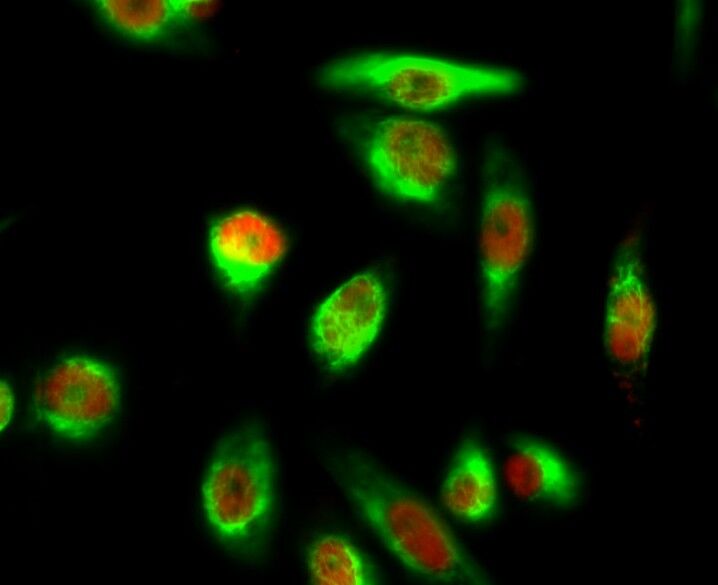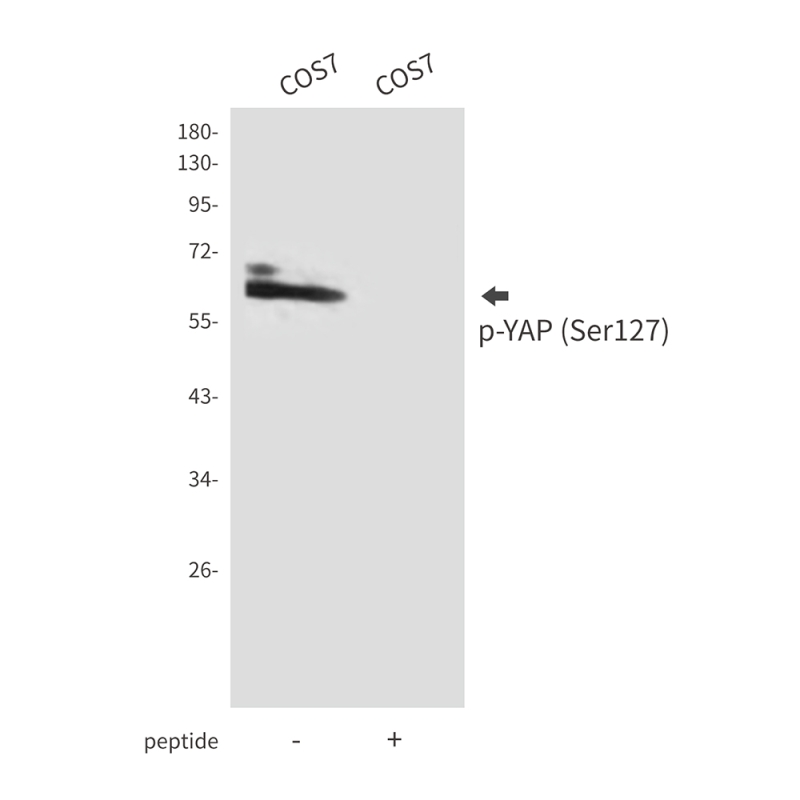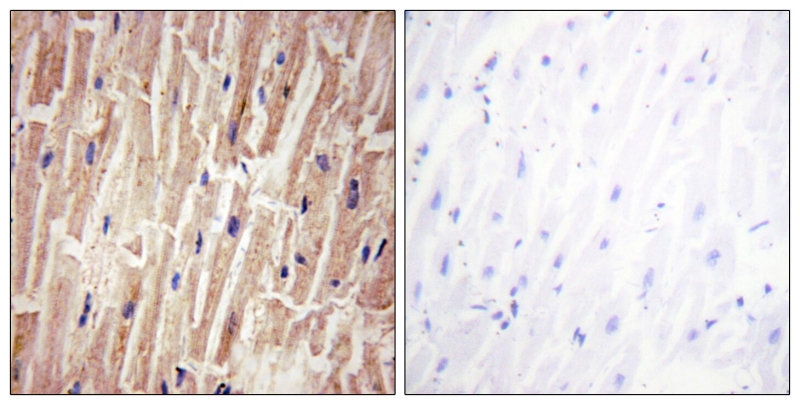


| WB | 咨询技术 | Human,Mouse,Rat |
| IF | 咨询技术 | Human,Mouse,Rat |
| IHC | 1/50-1/100 | Human,Mouse,Rat |
| ICC | 1/100-1/200 | Human,Mouse,Rat |
| FCM | 咨询技术 | Human,Mouse,Rat |
| Elisa | 咨询技术 | Human,Mouse,Rat |
| Aliases | YAP1; YAP65; Yorkie homolog; 65 kDa Yes-associated protein; YAP65 |
| Entrez GeneID | 10413 |
| WB Predicted band size | Calculated MW: 54 kDa; Observed MW: 65 kDa |
| Host/Isotype | Rabbit IgG |
| Antibody Type | Primary antibody |
| Storage | Store at 4°C short term. Aliquot and store at -20°C long term. Avoid freeze/thaw cycles. |
| Species Reactivity | Human,Mouse,Rat |
| Immunogen | Synthetic peptide of human YAP1 |
| Formulation | Purified antibody in PBS with 0.05% sodium azide,0.5%BSA and 50% glycerol. |
+ +
以下是关于Phospho-YAP (Ser127)抗体的3篇经典文献及其摘要:
1. **文献名称**:*Elucidation of a Universal Size-Control Mechanism in Drosophila and Mammals*
**作者**:Dong, J. et al.
**摘要**:该研究首次揭示Hippo信号通路通过磷酸化YAP(Ser127位点)调控其核质定位,抑制细胞增殖和器官大小。磷酸化的YAP被14-3-3蛋白捕获于胞质,阻止其与转录因子TEAD结合。
2. **文献名称**:*Role of YAP/TAZ in Mechanotransduction*
**作者**:Dupont, S. et al.
**摘要**:研究发现细胞外基质硬度和机械应力通过调节YAP(Ser127磷酸化)影响细胞行为。磷酸化的YAP在软基质中滞留于胞质,而在硬基质中去磷酸化后入核促进细胞增殖和干细胞分化。
3. **文献名称**:*The Hippo Pathway: Regulators and Regulations*
**作者**:Meng, Z. et al.
**摘要**:综述总结了Hippo通路核心组分(如MST1/2、LATS1/2)如何磷酸化YAP(包括Ser127位点),并讨论其在癌症(如肝癌、乳腺癌)中因磷酸化失调导致的YAP异常激活机制。
这些文献涵盖了Phospho-YAP (Ser127)在分子机制、生理功能及疾病中的关键作用,相关抗体常用于检测YAP活性状态。
Phospho-YAP (Ser127) antibodies are essential tools for studying the Hippo signaling pathway, a critical regulator of organ size, tissue homeostasis, and cancer development. Yes-associated protein (YAP) is a transcriptional coactivator that promotes cell proliferation and survival. Its activity is tightly controlled by phosphorylation. When the Hippo pathway is active, the kinases LATS1/2 phosphorylate YAP at Ser127. leading to its cytoplasmic retention via binding to 14-3-3 proteins. This prevents YAP from entering the nucleus and activating target genes like *CTGF* and *CYR61*.
Phosphorylation at Ser127 is a key regulatory mechanism for YAP inactivation under conditions of cell-cell contact, stress, or differentiation. Antibodies specific to phospho-YAP (Ser127) allow researchers to detect this inactive form, providing insights into Hippo pathway activity in cellular and tissue samples. These antibodies are widely used in Western blotting, immunofluorescence, and immunohistochemistry to study YAP regulation in development, regeneration, and diseases such as cancer, where YAP dysregulation is common.
It’s important to distinguish phospho-YAP (Ser127) from other phosphorylation sites (e.g., Ser381) that mediate proteasomal degradation. The Ser127 phosphorylation event reflects acute signaling changes, making it a dynamic marker for pathway activation. Validating antibody specificity with phosphorylation-deficient mutants or phosphatase treatment is crucial for accurate interpretation. Overall, phospho-YAP (Ser127) antibodies are indispensable for probing Hippo-YAP signaling in both physiological and pathological contexts.
×